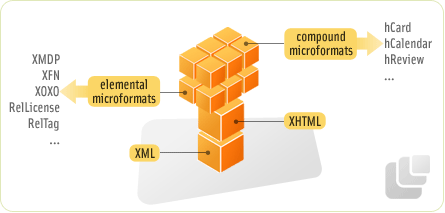Checking up on my posts from 2007 I noticed how I would evangelize some technologies as being the next wave of the web, and those should already be mainstream in 2009. Here are my thoughts on the matter, very subjective to my opinion and experiences.
Microformats
In 2009 I see large media websites and social networks to be adopting microformats, but corporate websites and such haven’t really though about it. Webdesigners and Webdevelopers that deserve such titles are already implementing microformats in their pages because it’s really simple to do so.
I believe traditional corporate developers don’t really care about this technologies. They are not a requirement for their projects and therefore not worth the time. A good way of correcting the problem would be to have Java and .NET promote these technologies.

The problem with microformats is not the server implementation. Wordpress alone transforms a lot of websites and blogs into a semantic repository. Long-tail websites like Upcoming and LastFM also provide microformats for their content. The major issue I find is the lack of uses, and browser integration for those.
It’s 2009 and none of the major browsers support the majority of microformats by default. It almost got into FF3 and it’s somehow in IE8, but not at the point people actually use it. Another opportunity would be using hCard information for the default data when you register an account in a new website.
At least uFs are out there just waiting to be used. The reverse would be much worse! We just have to give tools for people and machines to use them.
OpenID
OpenID suffers from the same browser-support problems as microformats, but in this one I agree it’s not browser-ready. There are few mainstream websites that support OpenID, and those that do have faulty implementations (usually the 1 account – 1 openid problem, or the problems in maintaining an UI for both traditional and openid logins).
Websites that support this technology are aimed at geeks or alpha-users go into the trouble of implementing OpenID. Others don’t, and until a perfect UI is reached I wouldn’t do it for a general user target.

OpenID is acceptable in a technical view, but when it comes to implement it may not be that simple (Google itself said they were taking their time to do it) and when it comes to UX the gap may be too big for the mom and dad kind of user.
What I happen to see a lot is twitter/facebook/etc… login option. Since the majority of uber-geeks have accounts in those websites, it’s easier to ask them to login in those websites than rather ask for an URL. You are what?
OpenSearch
OpenSearch hasn’t evolve at all. FF, IE and Opera all support it (safari doesn’t want to loose its simplicity, probably) and popular search engines also offer the description file (as well as this website). Users just don’t use it at all, since it’s easier to use google with one or two extra keywords.
Maybe when Google’s monopoly in online searches is at risk this might change.
OAuth
Of all three, this is the one that is working the best. It’s aimed at tech people, so with a few libraries, it’s a nice way of dealing with authentication of web APIs. I actually think it limits the developer to include a way of accepting the token in a web view, but most developers don’t seem to complain.
Asking for user and password is not secure, and people are starting to know that. Developers know that as well, and therefore want to offer a secure alternative. OAuth is the answer, and it’s looking pretty good. Even in Twitter mashups!
